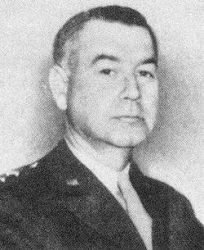
 |
|
|
||
|
Harry John Collins 'Hollywood Harry' |
||||
|
Engagements: • World War I (1914 - 1918)• World War II (1941 - 1945) |
||||
| Biography: | ||||
|
Harry John Collins Harry John Collins was born on 7 December 1895 in Chicago, IL. He was a graduate of Western Military Academy in 1915 and attended the University of Chicago before joining the U.S. Army in 1917. In 1917, he completed the Officer Training Camp at Little Rock, AR, and was commissioned as a Second Lieutenant of Infantry in the U.S. Army and assigned to the 3rd Infantry Regiment. After WWI, he remained with the 3rd Infantry Regiment at Camp Sherman, OH, and Fort Snelling, MN, until he was assigned to the 19th Infantry Regiment at Schofield Barracks, HI. A career officer, Collins served in variety of assignments in the U.S. and, in 1926, after attending the Infantry Officer Course at Fort Benning, GA, he remained there on the staff of the Infantry School. He then served as an instructor at Fort Ethan Allen, VT, in 1929-30 before completing the Infantry Advanced Course at Fort Benning later in 1930. In the early 1930s, Collins used his expertise in the placement and marksmanship of machine guns, to operate schools for machine gunners at Fort Sam Houston, TX, and Fort Warren, MA. After graduation from the U.S. Army Command and General Staff College (1934) and the U.S. Army War College (1935), he was again sent to Hawaii. In 1938, he was the Plans, Operations and Training Officer (S3) for the 7th Infantry Regiment at Vancouver Barracks, WA, and later commanded the Regiment's 1st Battalion, until becoming the Regiment's Executive Officer. He then served with the 6th Infantry Division at Fort Snelling as Assistant Plans, Operations and Training Officer (G3) and then as Intelligence Officer (G2). When World War II began, Collins was assigned to the staff at the War Department and sent to England as an Observer and Liaison. Upon his return to the U.S. in November 1941, he served as Intelligence Officer for the IV Corps. As a Colonel, his next assignment was to activate the 345th Infantry Regiment, a unit of the 87th Infantry Division, at Fort Carson, CO, which he then commanded. Collins was promoted to Brigadier General in August 1942 and made Assistant Division Commander of the 99th Infantry Division at Camp Yap Dorn, MS. In April 1943, he was promoted to Major General and named as Commanding General of the 42nd Infantry (Rainbow) Division at Camp Gruber, OK. The 42nd Division arrived in France in December 1944 and ended up playing a major role in stopping the last German drive in Western Europe, which famously became known as The Battle of the Bulge. The 42nd Infantry Division was also credited with liberating the Dachau Concentration Camp at the end of the war. Collins defied convention by naming Rabbi (Captain) Eli Bohnen, Division Chaplain. He had clearly been moved by the precarious situation of the survivors he found at Dachau, and did everything possible to provide them with private housing, first class rations, and complete medical attention. Collins' unusual efforts enabled Rabbi Bohnen to successfully appeal for assistance from civilians in the U.S. to provide items that the Army could not supply, such as kosher foods, religious articles, and money. Post-War Service Following V-E Day (8 May 1945), the 42nd Infantry Division assumed occupation duty in western Austria and MG Collins served as Military Governor. He was appointed Commander of the 2nd Infantry Division at Fort Lewis, WA, in July 1948 and later assumed command of New York-New Jersey Area Headquarters at Fort Totten, NY. MG Collins commanded the 8th Division at Fort Jackson, SC, in January 1951 and in January 1952, he was assigned to Office of Military Attaché in Moscow, USSR. He assumed command of the 31st Infantry Division at Camp Atterbury, IN, in October 1952. MG Collins retired from the Army in 1954. Medals and Awards Army Distinguished Service Medal Foreign Medals and Awards French Legion of Honor (Order of Chevalier) Honors Collins was made an honorary citizen of Salzburg, Austria, which the 42nd Division liberated from Nazis. He was also made an honorary citizen of Linz, where many Dachau survivors were initially transported after liberation from that camp. Post-Military Life After retiring from the Army, Collins worked as a Vice President for North American Van Lines and as a consultant to the Human Research Organization at George Washington University. Collins later moved to Colorado, where he lived until he and his wife, Irene, retired to Salzburg, Austria, an area he grew to love while serving there in World War II. In his later years, Collins was in ill health and used a wheelchair as the result of injuries sustained in a car accident. Family Collins' first wife was Maude Alice McAlpin Collins (1897-1955), and they were the parents of a daughter, Patricia. During his occupation duty in Austria, Collins met Irene Gehmacher, a native of that country. After his divorce from his first wife, he married Irene, who died in 1987. Death and Burial Major General Harry John Collins died on 8 March 1963. He is buried at Saint Peter's Churchyard Cemetery in Salzburg, Austria. Controversy In recent years, a few writers have found fault with Collins and other officers that performed occupation duty after World War II, suggesting that they requisitioned luxury items for furnishing their offices and quarters; items allegedly taken from Jewish families by the Nazis during the war. Many items were not returned to their original owners, who could not be located, and were later sold at auction with the proceeds used to aid war refugees. |
||||
| Honoree ID: 2356 | Created by: MHOH | |||
Ribbons
Medals
Badges
Honoree Photos
 |  |  |
 |  |
 |


